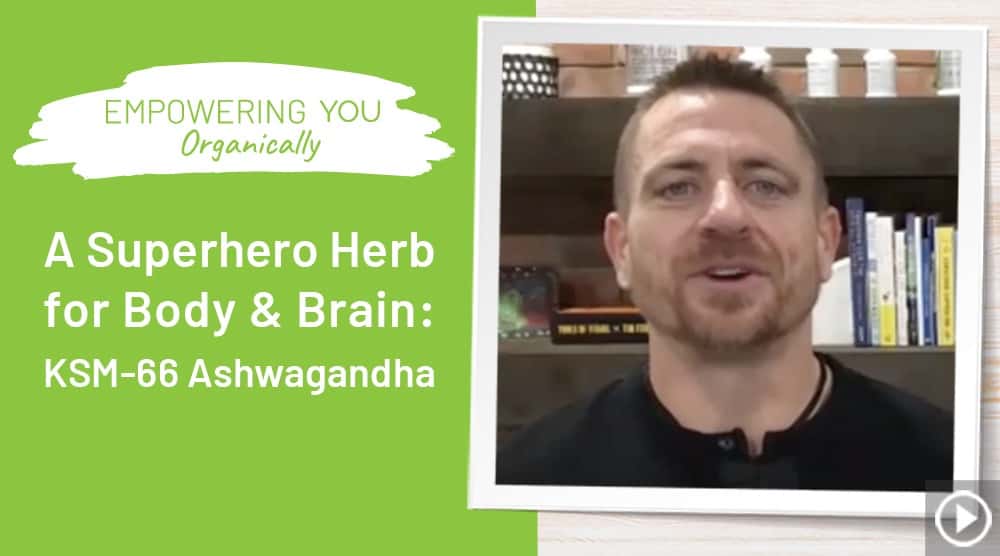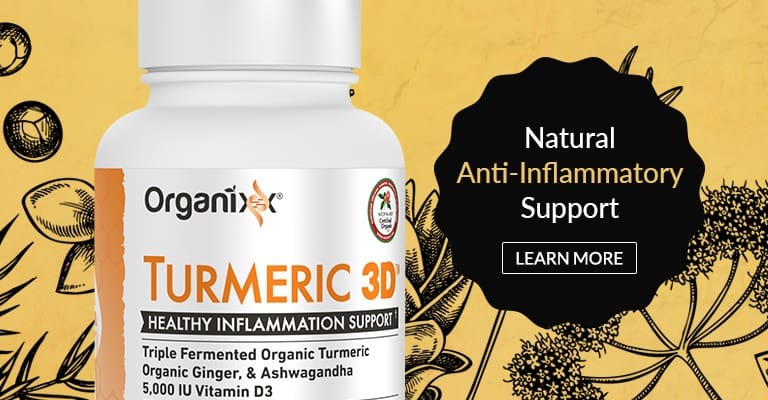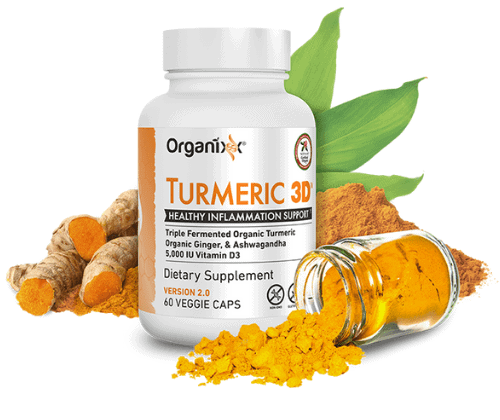Empowering you Organically – Season 9 – Episode 75
Title: A Superhero Herb for Body & Brain: KSM-66 Ashwagandha
Hosts: Jonathan Hunsaker, TeriAnn Trevenen
Description: Ashwagandha is an important herb used in the ancient Indian system of medicine known as Ayurveda to promote general health and well-being. In Ayurvedic practice, ashwagandha is classified as a Rasayana, which means an herb or preparation that rejuvenates, extends life, and promotes a youthful state of physical and mental health. Listen in to discover more about ashwagandha’s incredible health benefits in general and a special potent “superhero” form known as KSM-66 ashwagandha.
***
FEATURED PRODUCT
MAINTAIN HEALTHY INFLAMMATION LEVELS: Curcumin, the main healing compound found in turmeric, helps curb inflammation and supports your body in maintaining healthy inflammation levels.
ENHANCE YOUR MOOD: Researchers in a recent study studies found clear evidence that the compounds in turmeric helped maintain a healthy mood and disposition.
SUPPORT HEALTHY JOINTS: In addition to lowering overall pain and inflammation, curcumin has been shown to assist in pain reduction and inflammation, helping to maintain healthy joints.
MAXIMUM BIOAVAILABILITY: The fermentation process helps maximize your body’s intake of the amazing nutrients in this supplement!
***
What Does Ashwagandha Do?
Ashwagandha’s superpower is that it is an adaptogen. Adaptogens are non-toxic therapies that normalize our bodily functions – both physical and mental – that are thrown out of balance when we are exposed to chronic, uncontrolled stress. They do so by correcting imbalances in the neuroendocrine and immune systems [2]. In short, adaptogens enhance our ability to cope with stress.
There are more than 35 natural compounds in ashwagandha including alkaloids, steroidal lactones, saponins, and with anolides. These compounds have been shown to have anti-stress activity in multiple laboratory models of chronic stress and in some human studies as well [1-5].
Additionally, ashwagandha extracts as well as specific bioactive compounds present in this plant – primarily in the roots – have been shown to help:
- counter pain and joint swelling associated with arthritis
- boost various components of the immune system
- protect the brain and nervous system
- slow down or even kill abnormal cells
- enhance both male and female sexual desire and function
What Is KSM-66 Ashwagandha?
KSM-66 Ashwagandha is a high-concentration ashwagandha root extract manufactured and sold by Ixoreal Biomed, located in Hyderabad, India [6]. Ashwagandha KSM-66 is made solely from ashwagandha roots, which contain its main bioactive ingredients, without using any other parts that are considered to be less effective.
A unique feature of KSM-66 ashwagandha is that it’s standardized to a withanolide content of at least 5 percent. Withanolides are a group of around 300 naturally occurring steroid compounds, some of which are naturally present in ashwagandha.
One example is Withaferin A, an anti-inflammatory compound that has also been shown to stop tumors from growing their own blood vessels, slowing down their growth, and perhaps even shrinking them.
Last but not least, KSM-66 ashwagandha is produced by a unique extraction process, based on the principles of “green chemistry,” without using alcohol or any synthetic solvents.
Let’s take a closer look now at some of KSM-66 ashwagandha’s benefits for health.
What Too Much Cortisol Does to the Body
Any stressful event in our lives causes our adrenal glands to produce cortisol, a steroid hormone that acts to control blood sugar levels, regulate metabolism, lower inflammation levels, influence memory formation, and manage salt and water balance [7].
The more stressed we are and the longer we’re stressed, the more our adrenals respond by releasing cortisol into our bloodstream. Too much cortisol in the blood over a prolonged period of time can lead to:
- rapid weight gain
- high blood pressure
- osteoporosis
- muscle weakness
- mood swings
- anxiety, depression, or irritability
- increased thirst and frequency of urination [7]
Ongoing high cortisol levels can also eventually cause a lack of sex drive in men. In women, periods typically become irregular, less frequent, or may even stop altogether (amenorrhea).
How Can Ashwagandha Help Us Cope With Stress?
To answer this question, a double-blind, randomized, placebo-controlled trial was conducted to assess the safety and efficacy of KSM-66 ashwagandha (which, as mentioned above, is a high-concentration, full-spectrum ashwagandha root extract) in 64 adults [5]. After 60 days of treatment, the study authors observed a “substantial reduction” in four separate measures of stress in the study participants.
KSM-66 ashwagandha also reduced levels of the hormone cortisol in the blood. By lowering cortisol, ashwagandha tones down the body’s response to stressful situations, in effect “calming us down.”
No serious adverse events were reported [5] and the study researchers concluded that:
“High-concentration full-spectrum Ashwagandha root extract safely and effectively improves an individual’s resistance towards stress and thereby improves self-assessed quality of life.”
Similarly, in another randomized, double-blind, placebo-controlled study, 60 stressed but otherwise healthy adults were randomly assigned to take either a placebo or an ashwagandha root extract once daily for 2 months [8].
At the end of the study, participants given ashwagandha showed a significant reduction in their stress, anxiety, and depression scores. Once again, ashwagandha consumption was associated with a greater reduction in the levels of cortisol in the blood, when compared with placebo [8].
The Connection Between Stress and Obesity
Chronic stress has been associated with many illnesses, including obesity. In a double-blind, randomized, placebo-controlled trial, ashwagandha consumption was seen to lead to significant reductions in emotional and uncontrolled food cravings while also lowering cortisol, body weight, and body mass index (BMI) in 52 subjects subjected to chronic stress [9].
Indeed, laboratory experiments in mice have shown that one of the main active ingredients in ashwagandha known as Withaferin A can protect against obesity caused by a high-fat diet by reducing inflammation in the liver, oxidative stress, and insulin resistance [10].
These and other findings make it clear that ashwagandha is a powerful tool in our battle against ongoing stress, likely by regulating various specific aspects of our hypothalamus-pituitary-adrenal (HPA) axis. This is an interactive neuroendocrine system that plays a key role in maintaining our body’s internal equilibrium, along with orchestrating our body’s response to stress.
Ashwagandha Benefits for Joint Pain
Ashwagandha is a key ingredient in many Ayurvedic formulations prescribed for joint-related conditions such as osteoarthritis. Indeed, many research studies show that ashwagandha and its bioactive ingredients help to manage and reduce inflammation levels.
For instance, in a double-blind, placebo-controlled cross-over clinical trial published in 1991, 42 patients with osteoarthritis were randomized to receive a formula containing ashwagandha, frankincense, turmeric, and zinc – or placebo – for three months [11].
Clinical efficacy was evaluated every 15 days in terms of severity of pain, morning stiffness, Ritchie articular index (a weighted score of tenderness and swelling in 53 joint groups, each scored on a 0-3 scale), joint score, disability score, and grip strength. Throughout the study, the herbal formula was seen to significantly reduce the severity of joint pain and disability. No significant adverse effects were reported.
In another study, 86 patients with joint pain were given 5 grams of ashwagandha powder twice a day for three weeks with lukewarm water or milk [12]. Then these patients took another Ayurvedic preparation known as Sidh Makardhwaj – a formulation used in rheumatoid arthritis and neurological disorders – daily for the next four weeks.
Treatment with ashwagandha and Sidh Makardhwaj for seven weeks led to significantly improved scores of joint swelling, tenderness, and pain, indicating that this combination treatment is likely to be beneficial in rheumatoid arthritis. Indeed, in laboratory experiments, an ashwagandha root extract was seen to reduce inflammation in knee cartilage taken from chronic osteoarthritis patients [13].
Ashwagandha for Boosting Endurance, Muscle Strength, and Recovery
Ashwagandha has long had the reputation of being able to enhance cardiovascular endurance and physical performance. As stated earlier, consuming this herb is said to impart the strength and stamina of a horse [1].
In a prospective, double-blind, randomized, and placebo-controlled study, KSM-66 ashwagandha was shown to significantly boost cardiorespiratory endurance and improve self-reported quality of life (QOL) in 50 healthy male and female athletic adults [14].
In another randomized, prospective, double-blind, placebo-controlled clinical study, 57 young men with little previous experience in resistance training were randomized into treatment and placebo groups [15]. Participants in the treatment group consumed 300 mg of ashwagandha root extract twice daily, while those in the control group took starch placebos instead.
Multiple measurements – including muscle strength, muscle size, body composition, testosterone levels, and muscle recovery – were made before the start of the study. Both groups then went through resistance training for 8 weeks and the measurements were repeated when they were done.
Promisingly, the group of men taking ashwagandha root extract had significantly greater increases in muscle strength and arm muscle size relative to the placebo group. They also showed significantly less exercise-induced muscle damage, higher testosterone levels, and a greater reduction in body fat percentage. In other words, ashwagandha supplementation is associated with significant increases in muscle mass, strength, and recovery after exercise.
In another randomized, double-blind strength and conditioning study known as the STAR trial, 500 mg of an extract of ashwagandha roots and leaves was consumed by recreationally active young men for 12 weeks [16].
Body composition, muscular strength, power, and endurance, cycling time trial, and blood chemistry were measured before and after the study. Consuming the ashwagandha extract was seen to improve upper and lower body strength and improve distribution of body mass in these men, once again without causing any serious adverse effects.
Ashwagandha as an Immune System Enhancer
Ashwagandha enhances immune function. In a small study, ashwagandha root extract was seen to activate multiple types of immune cells in the participants [17].
Similarly, a tea fortified with five herbs including ashwagandha was seen to activate so-called “natural killer” (NK) cells in not just one, but two independent double-blind intervention studies conducted in India on healthy volunteers [18]. NK cell activity is an important aspect of our body’s early immune response to infections.
Interestingly, in other situations, ashwagandha extracts have also been shown to suppress specific components of the immune system. For example, one of the characteristic features of rheumatoid arthritis (RA) is the continuous production of pro-inflammatory compounds known as cytokines in joint cavities, triggering inflammation and cartilage destruction. In laboratory experiments in rats, a root extract of ashwagandha was seen to suppress production of pro-inflammatory cytokines and reduce oxidative stress [19].
The Brain-Boosting Benefits of Ashwagandha
Numerous laboratory studies show that ashwagandha – traditionally used in Ayurveda to boost intellect and memory – can slow, stop, and reverse damage to brain cells and may even help to reconstruct brain cell networks.
For instance, ashwagandha extracts have been shown to promote nerve cell growth in culture [20]. Withanolide A, withanoside IV, and withanoside VI were identified as the bioactive compounds responsible. Ashwagandha extracts as well as specific bioactive compounds (e.g., withanolide A) have also been shown to protect nerve cells in culture against damage caused by various toxic agents [21]. Amazingly, the administration of withanoside IV for 21 days led to recovery in a rat model of spinal cord damage [20].
It is well known that toxic free radicals damage brain cells and contribute to both normal aging and aging-related health conditions. In a 2015 study, both ashwagandha extracts and a bioactive compound known as withanone were seen to protect nerve cells from oxidative damage [22].
Not surprisingly, ashwagandha has long been used in Ayurveda to enhance memory and improve mental faculties. In a randomized, double-blind, placebo-controlled pilot study, 50 adults suffering from mild cognitive impairment (MCI) – who are considered to be at a greater risk of developing dementia later in life – were treated with either 300 mg of KSM-66 ashwagandha twice daily or placebo for 8 weeks [23].
After 8 weeks, the ashwagandha KSM-66 group showed significant improvements in both their immediate or short-term as well as general memory, relative to the placebo group. The ashwagandha group also showed significant improvements in executive function, sustained attention, and information-processing abilities.
Can Ashwagandha Even Help Protect Against Abnormal Cell Growth?
Ashwagandha and other species of Withania are well known in folk medicine traditions for their anti-cancer properties and their extracts have been shown to be toxic for multiple types of cancer cells in laboratory experiments [24]. They appear to act by slowing down or even stopping cancer cell growth by inducing programmed cell death or “apoptosis.”
As stated earlier, Withaferin A, an anti-inflammatory withanolide, has been shown to act as an anti-angiogenic. In other words, it can help stop tumors from growing their own blood vessels, slowing down their growth, or perhaps even shrinking them.
As reported in the journal Biochemical Pharmacology in August 2019, growing evidence suggests that Withaferin A is very effective against cancer [25]. For instance, low response rate and recurrence are common issues in lung cancer. Withaferin A has been shown to exhibit potent toxicity against several lung cancer cell lines in laboratory experiments. Not only that, the combination of Withaferin A and chemotherapeutic drugs were shown to have additive effects on lung cancer cell survival [26].
Withaferin A has also been shown to be toxic for breast cancer and cervical cancer (HeLa) cells in laboratory experiments [27,28]. Similarly, other bioactive compounds in ashwagandha have also been shown to be toxic for cancer cells in laboratory experiments [29].
KSM-66 Ashwagandha’s Impact on Libido and Infertility
Ashwagandha root extract has been shown to enhance sexual desire and function in both men and women. For instance, ashwagandha has been described in Ayurvedic medicine as an aphrodisiac that can be used to treat male sexual dysfunction and infertility.
In a pilot study conducted to evaluate the effects of ashwagandha in patients with a low sperm count (known as oligospermia), a total of 46 male patients were randomized either to treatment with KSM-66 Ashwagandha or placebo for 90 days [30].
At the end of the study, participants given KSM-66 ashwagandha showed a 167% increase in sperm count, a 53% increase in semen volume, and a 57% increase in sperm motility relative to baseline. In comparison, only minimal changes were seen in the placebo group.
Further, a greater improvement in hormone levels was seen with KSM-66 ashwagandha. In other words, ashwagandha is likely to be very effective in treating oligospermia, which is a leading cause of male infertility.
Similarly, a meta-analysis showed that ashwagandha significantly improved sperm concentration and sperm motility even in men with normal sperm parameters, without any adverse effects [31].
Ashwagandha has also been shown to enhance sexual function in women. At the Trupti Hospital and Santati Fertility Center located near Mumbai in India, 50 women were randomized to either ashwagandha treatment or placebo (300 mg twice daily) for 8 weeks [32]. In this study, ashwagandha supplementation was shown to lead to significantly higher scores in multiple markers of sexual desire and function.
But Is Ashwagandha Safe?
Ashwagandha root powder has been used in Ayurvedic medicine for centuries, and it is believed to be completely safe and free of any toxicity.
Extracts of ashwagandha made using alcohol and water will likely contain higher doses of its natural ingredients, relative to raw powder. So far animal studies with such extracts have shown no evidence of toxicity, even at relatively high doses [33].
However, it is always advisable to take an herbal supplement only after consulting your healthcare provider, especially if you have any ongoing health conditions or if you’re pregnant or breastfeeding.
Organixx Turmeric 3D Contains KSM-66 Ashwagandha
The Organixx Turmeric 3D formula has always contained ashwagandha extract. As part of our commitment to seeking out the cleanest and most effective supplement ingredients, we upgraded to KSM-66 Ashwagandha in 2019 – the most clinically studied ashwagandha on the market.
KSM-66 is a full-spectrum extract produced using a unique proprietary extraction process, based on “Green Chemistry” principles, without using alcohol or any other chemical solvent.
* * *
Subscribe to Empowering You Organically
Never miss an episode!
APPLE PODCASTS SPOTIFY GOOGLE PODCASTS
–
Episode 75 – A Superhero Herb for Body & Brain: KSM-66 Ashwagandha





